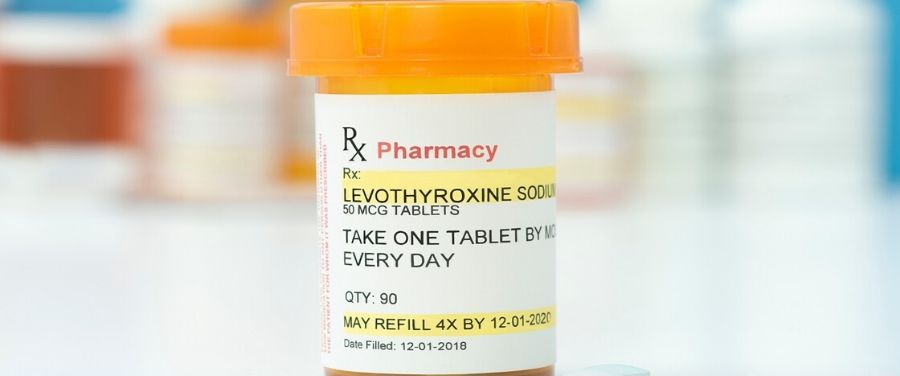Generic Name— Levothyroxine
Brand Name(s)— Levoxyl, Synthroid, Tirosint, Unithroid
What Is Levothyroxine?
Levothyroxine is a medication used to treat thyroid hormone deficiency. It is a manufactured form of the thyroid hormone thyroxine (T4). It is also known as L-thyroxine. It is taken orally by mouth or given by injection into a vein. [Trusted Source 1]
The medication is used to treat low thyroid hormone or hypothyroidism. It is also used to treat or prevent goiter i.e. enlarged thyroid gland caused by hormone imbalances, surgery, cancer or radiation treatment. [Trusted Source 2]
Levothyroxine is given when your thyroid doesn’t make enough of this hormone on its own.
Important Information:
Before taking this medicine, tell your doctor if you are allergic to it; or if you have a history of any other allergy. [Trusted Source 3]
Tell your doctor or health care provider your medical history, especially of —
- Diabetes
- High blood pressure
- Increased thyroid hormones (thyrotoxicosis)
- Decreased adrenal gland function
- heart disease such as coronary artery disease, irregular heartbeat
Older people may be more sensitive to the side effects of Levothyroxine, especially fast, pounding or irregular heartbeat. [Trusted Source 3]
The drug may be used during pregnancy. However, if you are pregnant, ask your doctor before taking this medicine. [Trusted Source 3]
The drug passes into breast milk but is unlikely to harm a nursing infant. However, consult your doctor or health care provider if you are breast—feeding. [Trusted Source 3]
Interactions:
Certain medications can make this medicine less effective if taken at the same time. If you take any of the following drugs, just avoid taking them within 4 hours before or after you take this medicine [Trusted Source 2] —
- Sucralfate
- Ferrous sulfate iron supplement
- Colesevelam
- Colestipol
- Cholestyramine
- Calcium carbonate such as Oyster Shell Calcium, Rolaids Soft Chew, Alka-Mints, Caltrate, Os-Cal, Tums, and others
- Sodium polystyrene sulfonate such as Kalexate, Kayexalate or Kionex
- Stomach acid reducers such as Omeprazole, Rabeprazole, Nexium, Esomeprazole, Lansoprazole, Prilosec, Prevacid, Zegerid, Protonix and others
- Antacids that contain aluminum or magnesium such as Gaviscon, Milk of Magnesia, Mintox, Maalox, Mylanta, Pepcid Complete, and others
What Are The Side Effects Of Levothyroxine?
Call your doctor or health care provider if you have [Trusted Source 2] —
- Fever
- Irregular heartbeats
- Sweating
- Tremors
- Weakness, tiredness
- Insomnia
- Chest pain
- Shortness of breath
- Hot flashes
- Vomiting
- Diarrhea
- Feeling depressed or irritable
- Headaches
- Leg cramps
- Muscle aches
- Feeling nervous or irritable
- Dryness of the skin or hair
- Hair loss
- Appetite changes
- Changes in your menstrual periods
- Weight changes
Common side effects of Levothyroxine may include —
- Muscle weakness
- Diarrhea
- Headaches
- Skin rash
- Leg cramps
- Nervousness
- Trouble sleeping
- Partial hair loss
What Happens If I Take An Overdose?
Overdose symptoms may include [Trusted Source 2] —
- Headaches
- Leg cramps
- Tremors
- Chest pain
- Shortness of breath
- Feeling nervous or irritable
- Fast or pounding heartbeats.
Seek emergency medical help or call the Poison Help line at 1—800—222—1222.
What Should I Avoid While Taking Levothyroxine?
Avoid food that can make your body absorb less Levothyroxine; such as [Trusted Source 2] —
- Grapefruit juice
- Walnuts
- Infant soy formula
- Cotton seed meal
- High—fiber foods
- Soybean flour
What Happens If I Miss A Dose Of Levothyroxine?
Take the medicine as soon as you remember. Skip the missed dose if it is almost the time for next dose. Do not take two doses at the same time.
